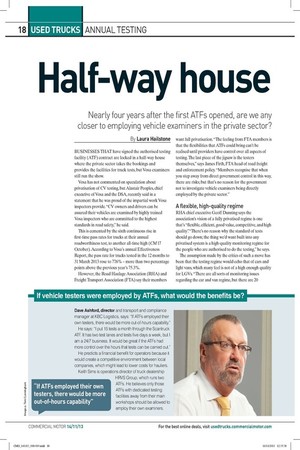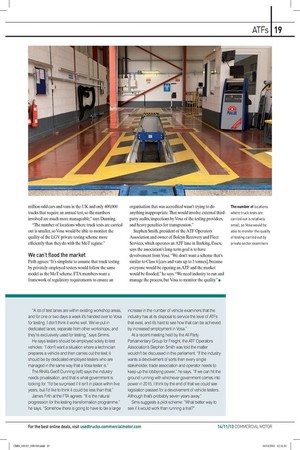Half way house
Page 14

Page 15

If you've noticed an error in this article please click here to report it so we can fix it.
Nearly four years after the first ATFs opened, are we any closer to employing vehicle examiners in the private sector? By Laura Hailstone
BUSINESSES THAT have signed the authorised testing facility (ATF) contract are locked in a half-way house where the private sector takes the bookings and provides the facilities for truck tests, but Vosa examiners still run the show.
Vosa has not commented on speculation about privatisation of CV testing, but Alastair Peoples, chief executive of Vosa and the DSA, recently said in a statement that he was proud of the impartial work Vosa inspectors provide. "CV owners and drivers can be assured their vehicles are examined by highly trained Vosa inspectors who are committed to the highest standards in road safety," he said.
This is cemented by the sixth continuous rise in first-time pass rates for trucks at their annual roadworthiness test, to another all-time high (CM17 October). According to Vosa's annual Effectiveness Report, the pass rate for trucks tested in the 12 months to 31 March 2013 rose to 77.6% — more than two percentage points above the previous year's 75.3%. However, the Road Haulage Association (RHA) and Freight Transport Association (FTA) say their members
want full privatisation. "The feeling from FTA members is that the flexibilities that ATFs could bring can't be realised until providers have control over all aspects of testing. The last piece of the jigsaw is the testers themselves," says James Firth, FTA head of road freight and enforcement policy. "Members recognise that when you step away from direct government control in this way, there are risks; but that's no reason for the government not to investigate vehicle examiners being directly employed by the private sector." A flexible, high-quality regime
RHA chief executive Geoff Dunning says the association's vision of a fully privatised regime is one that's "flexible, efficient, good value, competitive, and high quality'.'"There's no reason why the standard of tests should go down; the thing we'd want built into any privatised system is a high-quality monitoring regime for the people who are authorised to do the testing," he says. The assumption made by the critics of such a move has been that the testing regime would echo that of cars and light vans, which many feel is not of a high enough quality for LGVs. "There are all sorts of monitoring issues regarding the car and van regime, but there are 20
million-odd cars and vans in the UK and only 400,000 trucks that require an annual test, so the numbers involved are much more manageable," says Dunning.
"The number of locations where truck tests are carried out is smaller, so Vosa would be able to monitor the quality of the LGV private testing scheme more efficiently than they do with the MoT regime." We can't flood the market Firth agrees: "It's simplistic to assume that truck testing by privately employed testers would follow the same model as the MoT scheme. FTA members want a framework of regulatory requirements to ensure an
organisation that was accredited wasn't trying to do anything inappropriate. That would involve external thirdparty audits, inspections by Vosa of the testing providers, and heavy penalties for transgression." Stephen Smith, president of the ATF Operators Association and owner of Boleyn Recovery and Fleet Services, which operates an ATF lane in Barking, Essex, says the association's long-term goal is to have devolvement from Vosa. "We don't want a scheme that's similar to Class 4 [cars and vans up to 3 tonnes], because everyone would be opening an ATF and the market would be flooded," he says. "We need industry to run and manage the process, but Vosa to monitor the quality." •








































